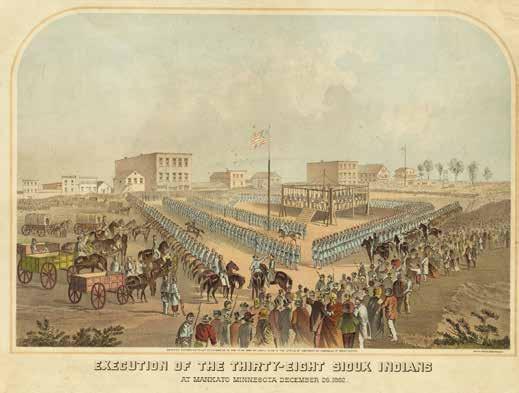[civil war issue]
His Red Nation: The Tale of Little Crow By Dakota Goodhouse
Taoyate Duta, His Red Nation was born the winter that Little Beaver’s cabin burned down (1810), in the Dakota village of Kaposia, Not Encumbered With Much Baggage (St. Paul, MN), where the Minnesota and Mississippi Rivers converge. His Red Nation was so named by his father, a prominent Mdewakanton Dakota chief by the name of Cetan Wakhuwan Mani, Hawk Hunting Walks. Due to a mistranslation, and probably because of His Red Nation’s status as son to Hawk Hunting Walks, His Red Nation is more commonly recognized as Little Crow. His Red Nation will forever be associated with the 1862 Minnesota Dakota Conflict, but the conflict was only the latest of terrible events. To understand the conflict and its consequences, one must examine the precarious circumstances in which the Eastern Dakota found themselves. The Santee Dakota, or Eastern Sioux, had actively traded with the French and English since about 1640. The English pushed west of what was considered then the Northwest Territory, or present-day Ohio. Colonel Robert Dickson, a British trade agent at the turn of 1800, became good friends with the Santee. His Red Nation was still a toddler when the War of 1812 broke out. Dickson recruited hundreds of Chippewa and Dakota and led them into Ohio to fight against Americans. Hawk Hunting Walks, was among those who fought for the English.
Top: Little Crow, photo by Whitney, 1862. Middle: Dakota Chief Ta-oya-te-duta, known in English as Little Crow, sketched at Traverse des Sioux, Minnesota Territory, by Frank Blackwell Mayer, 1851. Bottom: Chetaii wakan manii, The Sacred Pigeon-hawk Which Comes Walking, by Charles Bird King, 1824.
6
After the War of 1812, England and the United States signed the Treat of Ghent, ending warfare between the two countries. The treaty also gave control of Minnesota to the United States. The Santee would now have to deal with an unforgiving country they had initially fought against. Hawk Hunting Walks was honored with several gifts and accommodations from Colonel Dickson, but Hawk Hunting Walks refused them and was said to have kicked them, saying, “Now after we have fought for you, endured many hardships, lost some of our people, and awakened the vengeance of a powerful nation, our neighbours, you make a peace for yourselves, and leave us to get such terms as we can. You no longer need our services, and offer us these goods as a compensation for having deserted us. But, no—we will not take them; we hold them and yourselves in equal contempt.”







